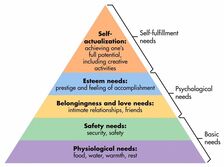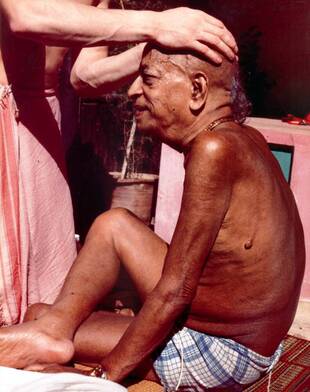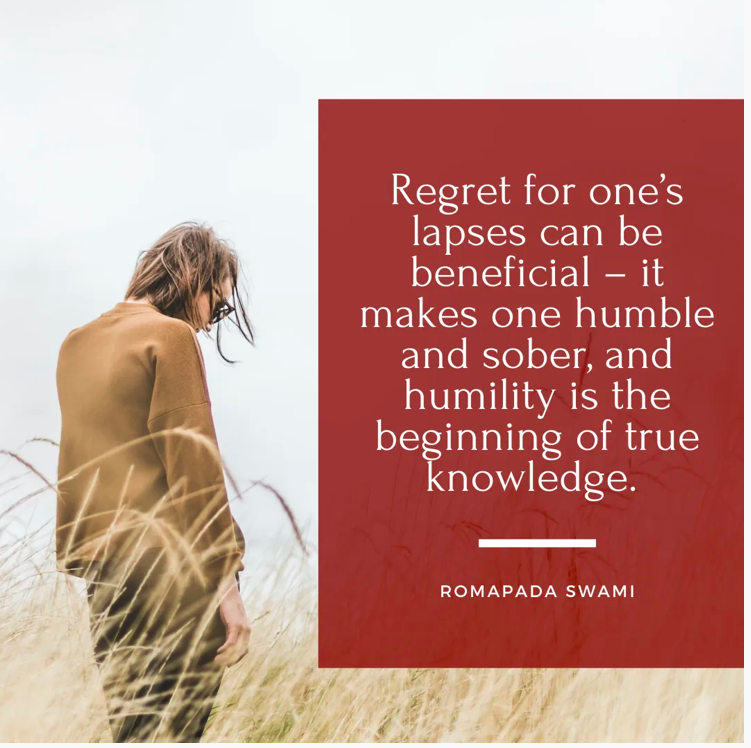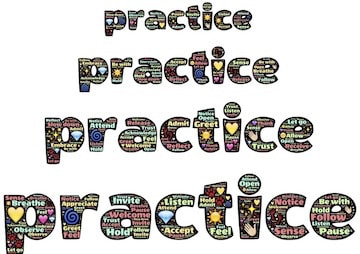|
In the book "Pathways to Nonviolent Communication* " by Jim Manske, one of the skills called "Beneficial regret" is defined as the following: "Acknowledging and learning from missed opportunities to meet needs, without guilt, shame, or self-punishment." The feelings of guilt and shame have been so far too well known to me, shading my life in many different ways. I assume that anyone familiar with these destructive emotions can agree that these rob us of our joy and are unquestionably the heaviest feelings we feel. Today an incident happened, giving me a first-hand experience of the power and beauty of beneficial regret versus guilt or shame. I chanted in the temple early morning and had my phone on silent mode. When I noticed it, my good husband had been messaging and calling me, wanting to be picked up and join the second morning program. I rushed home - yet it was too late... For a split second, I got a glimpse of the road of guilt-tripping myself and decided I was not going there anymore. Yet, I didn't want to close my heart and make the face that nothing had happened. I also didn't like to resort to self-defense and justify myself. At the same time, I didn't wish to deny that I felt sad and regretted missing the opportunity to serve my beloved husband. I desired to acknowledge my need to protect myself from unwanted disturbances by putting my phone on silent mode. Yet, simultaneously, I yearned to hold my husband's needs with at least as much care as mine. The choice to stay present to my sadness, and clarity about valuing my needs as much as my husband's, opened my heart to a beneficial regret. I regretted the missed opportunity sincerely and realized that I wanted to find different ways to protect myself from disturbances so that my good husband would still have the possibility to get the connection with me when needed. I celebrate the grace which enabled me to transform guilt into learning and to own my part in an outcome that did ultimately meet neither the needs of my dear husband nor me. I feel deeply grateful to my beloved Spiritual Master for encouraging me to continue learning, living, and sharing Nonviolent Communication*. These sweet fruits became possible only due to his causeless mercy. *Empathic Communication is inspired by and adapted to the devotee community from the Nonviolent Communication process developed by Marshall B.Rosenberg.
0 Comments
What do we mean by needs in Empathic Communication? Let's first get clear what do we mean by "needs" in Empathic Communication. By needs we mean something radicallly different than the economy we currently have tries to convince us "needing". Indeed, even by classical economic definitions, it’s not needs that the market attends to, it’s “effective demand” because there is no flow of care.  "Need" is the word we use in Empathic Communication for the deepest motivations behind anything people do, say, or think - behind any action or reaction. We are all born with essential physical, emotional, and spiritual needs and the innate resources to help us fulfil them. These innate needs are common to all humans, whatever our social-cultural background. Needs are a-scriptive, it is difficult to put words on what is also described as "the divine energy that connects all of us". Need-language is probably the closest we can get to verbally describe this divine energy. We can also call them values, or something that matters, or something that is important. Whatever we call them, we are looking for something that is:
Do needs have a hierarchy in Empathic Communication?  When we think about human needs, we may recall Abraham Maslow, who presented the concept of needs in a hierarchy. His pyramid starts at the bottom with physiological needs, then safety needs, followed by needs for belonging, then for esteem, and finally at the top, needs for self-actualization. In Empathic Communication, there is no hierarchy of needs (apart from the basic need for subsistence or survival), as postulated by Maslow. Needs are dynamic, and there may be many needs simultaneously present. All human beings share the same needs, but we perceive them with varying intensity and use different strategies to meet them. Recognizing our own and others' needs means connecting with what is alive in other people or us at a particular moment, and this is where bridging seemingly unsolvable differences become possible. "Srila Bhaktivinoda Thakura mentions that we have material as well as spiritual needs, and to progress smoothly on the spiritual path, both types of needs should be addressed." Can needs be elevated?  So, in this regard there are no "lower" or "higher" needs or question of "elevating" needs - all needs are life serving. Like in Krishna Consciousness, there is no higher or lower devotional service. Pujari's service on the altar or sweeper's service on the street are equal when done with devotion. In another hand, elevating needs can be understood what we're doing in Krishna consciousness. For example, when I am hungry and I'm taking prasad, I am not satisfying so called "lower order" need for food. It's actually the devotional service - honoring prasadam. When I am going for exercise, the gym or walking it is not just meeting my need for physical movement, but it is a service in devotion because I am doing it in Krishna consciousness. I am doing it for maintaining the body that belongs to Srila Prabhupada and is meant to be used in his service. So, it's fully bona fide devotional service. In this kind of consciousness it doesn't no longer feel like a "lower order" need because it is already elevated, it is devotional service. For example, when Srila Prabhupada was taking a massage he was not enjoying the massage at a bodily need level, he was fully absorbed in Krishna and is conscious that his body needs maintenance for service. So it's no longer "a lower order" need. When we dovetail all our needs in Krishna consciousness they're elevated. "The devotees think of Krishna, act for Krishna, eat for Krishna, sleep for Krishna and work for Krishna. Thus everything is engaged in the service of Krishna. A total life in Krishna consciousness saves one from material contamination." Another thought is that it is true that the so called "lower order" needs do disappear or diminish. For example, the Six Goswamis could survive on a cup of buttermilk because of elevation of consciousness. So it is true that by being fully Krishna conscious, they almost didn't need sleep, they ate very little and they didn't have a need for recreation other than their devotional service. "One should learn how to dovetail everything in the service of the Lord, for everything is connected to Krishna. That is the real purpose of life and secret of success." Joyfully in your service, Sri Radhika devi dasi and Madhuri Radhika devi dasi In one of the Empathic Communication workshops, an interesting question was asked: "Does Krishna demand us to surrender to Him as could be understood from Bhagavad-gita As it Is, 18.66?" "Abandon all varieties of religion and just surrender unto Me. I shall deliver you from all sinful reactions. Do not fear." Answer as well is found in Bhagavad-gita, 18.63: "Thus I have explained to you knowledge still more confidential. Deliberate on this fully, and then do what you wish to do" In a purport His Divine Grace Srila Prabhupada states: "Here the words yathecchasi tathā kuru – “As you like, you may act” – indicate that God does not interfere with the little independence of the living entity." In the purport of Srimad Bhagavatam, 3.5.28 Srila Prabhupada explains: "All living entities are differentiated parts and parcels of the Personality of Godhead. Under the pressure of false ego, the conditioned souls, although parts and parcels of the Supreme Personality of Godhead, claim to be the enjoyers of material nature. This false ego is the binding force of material existence. The Lord again and again gives a chance to the bewildered conditioned souls to get free from this false ego, and that is why the material creation takes place at intervals. He gives the conditioned souls all facilities for rectifying the activities of the false ego, but He does not interfere with their small independence as parts and parcels of the Lord." Based on this, we can conclude that Krishna doesn't demand surrender. He has given us, His tiny parts and parcels, "the little independence", or free will. So, we better do some internal inventory to discover our inner demands that are killers of joy and reclaim our power to choose! A helpful practice can be:
For example, I notice telling myself "I have to chant my rounds."
Could it be my need for connection? Connection with my true self and my divine origin, The Supreme Personality of Godhead, Krishna? Maybe it's my desire for self-realization? My desire to serve and please my spritual master?
Having discovered these beautiful motivations as a driving force behind my choice to chant, I feel empowered, I pick up my japa-mala with renewed enthusiasm and keep chanting - Hare Krishna, Hare Krishna, Krishna Krishna, Hare Hare... Gratefully in your service, Madhuri Radhika dd A current unfortunate situation in Eastern Europe touches each of us no matter how close or far we are geographically. Many of us may feel heart-wrenched and helpless, not knowing what we could do to help those suffering. Myself amongst them. Therefore I asked His Holiness Bir Krishna das Goswami who answered; "As far as the war is concerned, we should be manifesting compassion to all those affected by it. Srila Bhaktivinoda Thakura writes in Jaiva Dharma, "A natural human sentiment, compassion finds its highest expression in the works of devotees of the Lord. The tenderness of the heart experienced toward Krishna is known as bhakti. All other jivas are servants of Krishna. When one experiences tenderness of heart toward them, it is known as daya, compassion. Therefore, compassion is included within bhakti." Gratefully in your service,
Madhuri Radhika dd People often think about Empathic Communication (EC) as a practice for communicating with other people. It is that, of course. But it is also much more. The processes, EC offers us for connecting with ourselves, are core for integrating EC and for making significant changes in our lives. An aim of self-connection is to experience true choice and inner freedom about how we live and what we do. True inner freedom arises from self-connection. Without self-connection, we are mostly acting from old habits, and those habits do not necessarily attend to our needs. *** What is self-connection? For me, it means: I connect with myself. Connecting with myself includes getting caring and curious about what’s going on inside me,
Adapted from late Inbal Kashtan. With gratitude and loving memory, Madhuri Radhika dd Dear Reader,
Practice is our best ally while integrating Empathic Communication (EC) skills and consciousness into our lives. Therefore we created a space here to support each other on this sweet journey. You are most welcome to write in the comments section about your experience while using EC in different situations in your life, ask questions, share your celebrations and mournings, or ask for empathy. Welcome! Let's Get Better Together! Yours Madhuri Radhika dd |
Archives
April 2023
Categories |









 RSS Feed
RSS Feed
